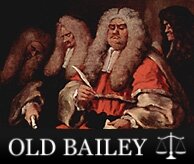As several posts have nicely illustrated, creative visualizations of the entire Old Bailey archive can provide new and intriguing glimpses into history. It’s important to keep in mind that one can play around with smaller subsets of the data as well, just to get a quick sense of what going on in particular contexts. For example…
Using the prototype tool/process mentioned in the previous entry (Old Bailey API -> Zotero -> Voyeur), I was able to extract from the OB records that contain the word poison (about 400).
I could then send those records (or a subset of them) to Voyeur to get a better sense of what’s going on with these particular records in the context of poison.
Filtering out the usual stop words and other words that happen to be common to the trial records, like “prisoner”, I can see that “drank” is one of the more common words to appear in my search results. Zeroing in on the context of “drank”, I can see that one of words that most commonly appears nearby is “coffee”.
Of course it’s no surprise that a strong, bitter drink would be a vehicle for administering poison. Or perhaps that cheap coffee tasted so bad that someone, having fallen ill for any reason after drinking coffee, could feel as if they had been poisoned by it. Perhaps more significantly, I also learned that “ate” or “eaten” appears hardly at all near the word “poison”.
Are these revolutionary historical observations? No. But that’s not my goal here. Rather, I’m just trying to get an informal sense of the context in which poison is being discussed. Had I read through these https://florafox.com/ru/krasnodar, I might have noticed the frequent mentions of coffee at some point. But then I would need to go back through all other records to see what I’d missed. My sample here is only a few hundred records; the task of rereading the archive doesn’t really scale to several thousand or more records, at least for practical purposes.
Although obviously not groundbreaking, the “coffee” discovery does say something interesting and prompts other questions. Maybe I should search for coffee in trial record from other archives. Are there other documented connections between coffee and poisoning? I certainly have more questions than answers. More importantly, I was able to garner historical evidence (granted, from just one source in this case) about the nature of poisoning in London in just a few minutes of playing around. One could minimize this discovery by claiming its obviousness. But such an attitude discards the distinction between a priori assumptions and evidence-based historical interpretation.
Obviously, this post really isn’t about coffe. It tries, rather, to show that the learning curve for some quick inquiries into the archive is neither long nor steep. While nothing I’ve done here could be considered technically sophisticated, it is revealing. And it shows that it’s never been easier to get a rough sense of what an archive or set of texts can tell us, especially when focusing on one particular context at a time and thus sidestepping the daunting complexities of dealing with much more data all at once.











